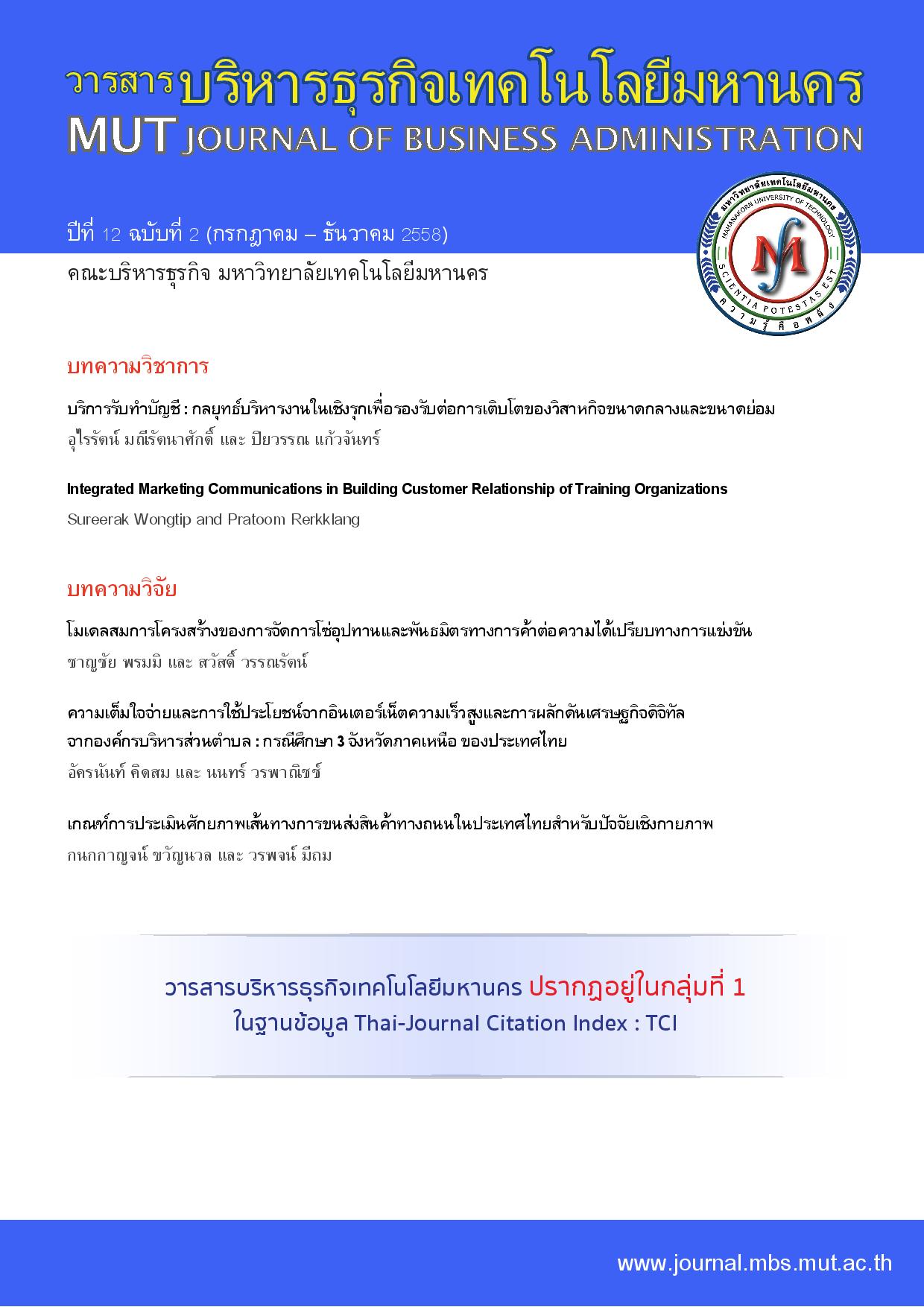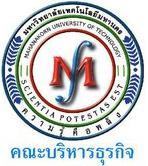ความเต็มใจจ่ายและการใช้ประโยชน์จากอินเตอร์เน็ตความเร็วสูง และการผลักดันเศรษฐกิจดิจิทัล จากองค์กรบริหารส่วนตาบล : กรณีศึกษา 3 จังหวัดภาคเหนือของประเทศไทย
Keywords:
ความเต็มใจจ่าย, อินเตอร์เน็ตความเร็วสูง, เศรษฐกิจดิจิทัล, Willingness to Pay, High-speed Internet, Digital EconomyAbstract
งานวิจัยชิ้นนี้ ศึกษาข้อเท็จจริงในการใช้อินเตอร์เน็ตความเร็วสูงในพื้นที่ที่มีการเข้าถึงต่ำสุด 3 จังหวัดเป้าหมาย ในเขตภาคเหนือของประเทศไทย พร้อมทั้งศึกษาถึงความเต็มใจจ่าย และการใช้ประโยชน์ในเชิงเศรษฐกิจของผู้ใช้อินเตอร์เน็ตในศูนย์อินเตอร์เน็ตชุมชน ในพื้นที่ดังกล่าว นอกจากนี้ยังได้ทำการศึกษาเพิ่มเติมถึงความรู้ความเข้าใจขององค์การบริหารส่วนตำบลตัวอย่าง ในนโยบายเศรษฐกิจดิจิทัลของรัฐบาล และความสามารถในการผลักดันนโยบายไปสู่ท้องถิ่นที่มีอยู่ในปัจจุบัน
ผลการศึกษาด้านการใช้ประโยชน์จากอินเตอร์เน็ตในพื้นที่เป้าหมายนั้น กลุ่มตัวอย่างส่วนใหญ่ใช้ประโยชน์อินเตอร์เน็ตเพื่อการหาข้อมูลเพื่อการทำงาน และการดูวิดีโอการฝึกอาชีพ ในขณะที่เป็นที่น่าสังเกตว่ามีกลุ่มตัวอย่างในสัดส่วนค่อนข้างน้อย ที่ใช้อินเตอร์เน็ตในการหาข้อมูลตลาดและราคาสินค้าการเกษตร หรือหาความรู้ด้านภาษาต่างประเทศ อย่างไรก็ตามประโยชน์ชัดเจนในการใช้อินเตอร์เน็ต ได้แก่ ตัวอย่างส่วนใหญ่ได้ใช้เพื่อหาข้อมูลเกี่ยวกับโรคภัยไข้เจ็บ ยา ตลอดจนการใช้ยาในการรักษาโรค ในขณะที่เมื่อพิจารณาถึงความเต็มใจจ่าย พบว่า กลุ่มตัวอย่างโดยเฉลี่ยน่าที่จะยอมจ่ายค่าบริการอินเตอร์เน็ตต่อเดือนอยู่ในช่วง 300 ถึง 600 บาทต่อเดือน โดยได้ค่าเฉลี่ยต่อเดือนราว 454 บาทต่อเดือน โดยสามารถสรุปได้ว่า กลุ่มตัวอย่างยอมจ่ายมากกว่าเมื่อทราบว่าจะต้องรอนานเท่าใดหากจ่ายน้อย
ผลการศึกษานโยบายเศรษฐกิจดิจิทัลของรัฐบาลและกลไกการขับเคลื่อนที่มีอยู่ในปัจจุบัน พบว่า รัฐบาลพยายามผลักดันนโยบายเศรษฐกิจดิจิทัล ผ่านยุทธศาสตร์ในการขับเคลื่อน 5 ด้าน โดยได้ผ่านร่างพระราชบัญญัติที่เกี่ยวข้อง 2 ฉบับ และมีคณะกรรมการเฉพาะด้าน 5 ด้าน เพื่อขับเคลื่อนประเด็นนี้ อย่างไรก็ตาม เมื่อศึกษาในเชิงพื้นที่เกี่ยวกับความรู้ความเข้าใจในนโยบายและการขับเคลื่อนนโยบายเศรษฐกิจดิจิทัล พบว่า ผู้ให้สัมภาษณ์ซึ่งเป็นตัวแทนจากองค์การบริหารส่วนตำบล ร้อยละ 60 ไม่เข้าใจความหมายของเศรษฐกิจดิจิทัล และไม่เคยได้ยินคำนี้มาก่อน นอกจากนี้ ร้อยละ 85 ของผู้ให้สัมภาษณ์ ไม่ทราบว่ารัฐบาลมีการขับเคลื่อนเศรษฐกิจดิจิทัล สรุปได้ว่า ในภาพรวมยังไม่มีการเตรียมความพร้อมเพื่อขับเคลื่อนนโยบายเศรษฐกิจดิจิทัล ผ่าน อบต.
Willingness to Pay and Usage for High-speed Internet and Digital Economy Promotion of the Local Administrative Unit: A Case Study of 3 Northern Provinces in Thailand.
This research report explores facts on high-speed internet usage of the low internet penetration area. Three lowest provinces of the Thailand north are then selected. The study includes willingness-to-pay, economic usages of internet users drawn from the subsidized internet community center. Moreover, regarding current policy implementation from central government to local administrative body called Subdistrict Administrative Organization (SAO), the understanding in digital economy policy of the sampled SAO is assessed.
Considering economic usage of internet, most of the samples utilize the internet to search for working purposes and to see career training video contents. It is noticeable that very few of them using internet to access agricultural market and price information or to learn foreign language. However, it is clear that there are benefits of the internet in searching for information regarding medical care and medical drug usage. Turning to willingness to pay for high-speed internet, on average, the samplings are willing to pay monthly internet fee in the range of 300 to 600 Baht with weighted average fee of 454 Baht per month. It also can be concluded that the samples are willing to pay more when the waiting period of downloading internet content is revealed.
The current digital economy policy and maneuvering mechanism are supported by five strategic thrusts, two cabinet-approved drafted Acts, with five specific committees at the central level. However, from the local point of view, the understanding in digital economy policy of the sampled SAOs is very limited. Around 60 percent of the samples SAOs do not understand the real meaning of digital economy, and around 85 percent of the SAOs do not know about the government digital economy policy at all. In conclusion, there is no preparation to push forward the digital economy policy at the local administrative level.
Downloads
Issue
Section
License
ข้อความ ข้อคิดเห็น ข้อมูล เนื้อหา รูปภาพ แผนภูมิ แผนผัง เป็นต้น ที่ปรากฏและแสดงในบทความต่างๆ ในวารสารบริหารธุรกิจเทคโนโลยีมหานคร ถือเป็นความรับผิดชอบโดยตรงของผู้เขียนบทความนั้นๆ มิใช่เป็นความรับผิดชอบใดๆ ของวารสารบริหารธุรกิจเทคโนโลยีมหานคร และมหาวิทยาลัยเทคโนโลยีมหานคร
บทความที่ตีพิมพ์ในวารสารบริหารธุรกิจเทคโนโลยีมหานคร ถือเป็นลิขสิทธิ์เฉพาะของคณะบริหารธุรกิจ มหาวิทยาลัยเทคโนโลยีมหานคร หากบุคคลหรือหน่วยงานใดต้องการนำทั้งหมดหรือส่วนใดส่วนหนึ่งไปเผยแพร่ต่อหรือเพื่อกระทำการใดๆ จะต้องได้รับการอนุญาตเป็นลายลักษณ์อักษรจากคณะบริหารธุรกิจ มหาวิทยาลัยเทคโนโลยีมหานครก่อนเท่านั้น


